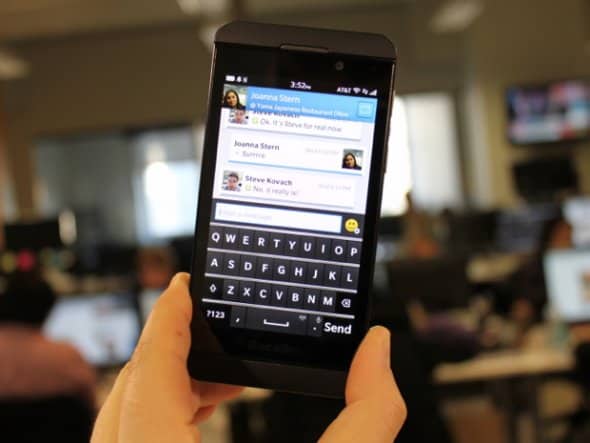
 Late last month, tucked inside a Facebook filing, was information that was of interest to anyone who follows the potentially lucrative instant messaging space. The California-based social media giant, which had acquired the flourishing WhatsApp in February for $19-billion (The actual number would rise because the value of Facebook’s stock did), revealed the cold hard numbers on the service, and they weren’t pretty.
Late last month, tucked inside a Facebook filing, was information that was of interest to anyone who follows the potentially lucrative instant messaging space. The California-based social media giant, which had acquired the flourishing WhatsApp in February for $19-billion (The actual number would rise because the value of Facebook’s stock did), revealed the cold hard numbers on the service, and they weren’t pretty.
For the first six months of 2014, WhatsApp posted a net loss of $233 million on revenue of just $15-million. The numbers may be a bit misleading because the culprit for $206.5 million of the red ink was share-based compensation expenses and the issuance of common stock below fair value. But the report did perhaps ensure that the proverbial two guys in a garage looking to build the next game changing platform might be scared away to apply their talents to gaming or mobile payments or whatnot.
So this is the instant messaging space in late 2014. Everyone is growing, but no one is making money yet. Not WeChat (also known as Weixin), which dominates China but sees the United States as market that may be too difficult to try and crack. Not SnapChat, which turned down $3-billion from Facebook. And not Viber, which was acquired in February by Japanese ecommerce company Rakuten after posting a loss of $29.5-million in 2013.
The instant messaging market is at an important stage in its maturity and will likely be defined by M&A contraction in 2015, if it isn’t already. For now, though, entrants are faced with a familiar business conundrum: consumers want to send instant messages to their friends. Companies want to make money from them doing this, but can’t charge for the service because there is too much competition. So they try to make money in other ways. Virtual stickers. Advertising. Sponsored content. All of these seem wanting, or at very best a mere part of the solution to the monetization puzzle.
BlackBerry CEO John Chen says his goal for BBM, which went cross-platform a little more than a year ago, is to generate $100-million in revenue. Some think the generally conservative Chen is for once being too optimistic, given the nature of the space right now.
“[Mr. Chen] wants to generate $100-million from BBM … I’m not saying it’s impossible, but it’ll be interesting to see how he does that,” Frost & Sullivan telecom analyst Ronald Gruia told the Globe and Mail in May. Gruia says the messaging space is currently a “very tough environment”.

This week, BlackBerry revealed new BBM features, including a a SnapChat-style timed message feature and another that lets users remove a message before the recipient has read it. The company is rolling out these things for free, but say it may decide to charge later. The move, however, seems to be as much about defense as offense. It’s easy to posit that services such as these have become table stakes in the race for instant messaging eyeballs.
And BlackBerry Messenger is getting more of those eyeballs. In its recent Q2, 2015 earnings report, which covered the three months ended August 30th, the company highlighted the fact that BBM had more than 91 million monthly active BBM users, up from 85 million in the prior quarter. This, of course, is a fraction of the more than 600-million users that WhatsApp boasts.
And it’s here though where the larger business strategies of BBM and BlackBerry as a whole should converge. BlackBerry has a single executable opportunity in front of it that has nothing to do with the teen market Facebook is cultivating with WhatsApp. Nothing to do with stickers or emoticons. And though the company does not back out its numbers on BBM, it’s clear that Chen would have little patience for the dollars involved chasing consumer whims anyway. We have learned, over the course of a year of watching his leadership, that the stealthy Chen hunts with an arrow, not with the spray of a machine gun.
BBM’s real opportunity is in delivering a secure, full featured messaging service to the enterprise market.
The corporate environment of 2014 is practically defined by security scandals. These now happen so often as to not be noticed by the general public. Did you hear that 83-million accounts were hacked at JPMorgan Chase? That was less than a month ago. What about the Staples hack? That was a couple weeks ago.
The New York Times reports that the The Secret Service this summer estimated that upwards of 1,000 American merchants have been hacked, and that “In each case criminals scanned for tools that typically allow employees and vendors to work remotely, then used those tools to install malware on retailers’ systems.”
At the 2014 Mobile World Congress in Barcelona, BlackBerry unveiled eBBM, a service aimed at allowing enterprise clients to use a messaging service that is secure.
“BBM Protected will provide an unrivalled level of trust in enterprise messaging with end-to-end encryption of messages that uses symmetric encryption keys for BBM messages and best-in-class technology for public-private signing and encryption key pairs,” said BlackBerry.
Winning the enterprise messaging app isn’t going to make the news like a lineup at the mall for the new iPhone or the splashy figure that Facebook paid for WhatsApp, for that matter, but it is a good business for BlackBerry right now. We are clearly in an environment where enterprise clients can, and should, pay BlackBerry for the secure solution it is offering them. BlackBerry should take their money.
Leave a Reply
You must be logged in to post a comment.





 Share
Share Tweet
Tweet Share
Share




Comment